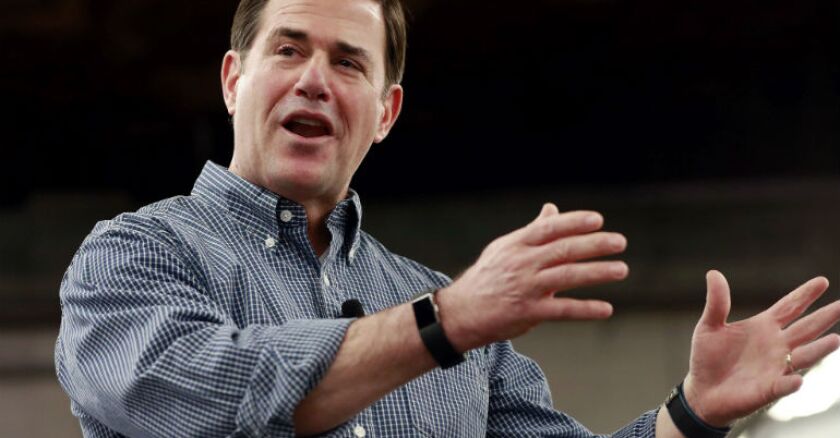Arizona Gov. Doug Ducey said he will block state incentives for a new 500-employee Nike factory in his state because the company is withdrawing a sneaker that featured an early version of the American flag.
However, the Arizona city offering local incentives said it will honor its agreement with Nike. The Oregon company said it plans to go ahead with the factory, but did not specify whether it will still build in the city of Goodyear.
The dispute started Monday when The Wall Street Journal reported that Nike had withdrawn the shoe at the request of former NFL quarterback Colin Kaepernick and others. The sneakers featured an early version of the American flag, sometimes called "The Betsy Ross flag."
According to the paper, Kaepernick and others found the shoe offensive because they associate the flag with slavery. Kaepernick is a Nike endorser known for his controversial protests of racial injustice.
Some contemporary extremist groups use the flag as a symbol, according to the NAACP. For example, Portland freelance journalist Mike Bivens noted Thursday that Jeremy Christian wore a variation of the Betsy Ross flag while issuing a Nazi salute in an April 2017 rally. That's a month before Christian fatally stabbed two people on a Portland MAX train.
While racists use the flag, though, others reject those associations and see it as a symbol of democracy and patriotism celebrating the nation's founding.
"Nike has made its decision, and now we're making ours. I've ordered the Arizona Commerce Authority to withdraw all financial incentive dollars under their discretion that the state was providing for the company to locate here," Ducey, a Republican, wrote in a series of 3 a.m. tweets Tuesday.
Nike was silent on the controversy until midday Tuesday, when it issued a statement confirming it had stopped selling sneakers with the flag.
"Nike made the decision to halt distribution of the Air Max 1 Quick Strike Fourth of July based on concerns that it could unintentionally offend and detract from the nation's patriotic holiday," the company said.
Nike highlighted what it said were the company's patriotic bona fides including sponsoring U.S. Olympic and soccer teams and employing 35,000 workers in the U.S. The company said it still plans a new U.S. factory with 500 jobs, but declined to say whether it will proceed in Arizona.
The Phoenix Business Journal and Arizona Republic reported Tuesday that Nike had planned to spend at least $185 million on the factory, which would make air sole cushioning for its shoes. The company has a similar facility in Beaverton.
The Arizona Republic reported that local governments had offered Nike $2 million in waived fees and subsidies to build the factory. Oregon's economic development office said Monday that Nike had not inquired about incentives to build the new facility here.
It's not clear Ducey has the power to block the factory, or the incentives. The Arizona Republic reported incentives approved Monday night were all local, without any evident tie to state funds.
And Georgia Lord, mayor of Goodyear, said it will abide by the terms of the deal the city council approved Tuesday.
"The city of Goodyear has found itself in the middle of a difficult situation," Lord wrote in a statement. Citing the 500 jobs the city anticipates from the factory, Lord said "We will honor the commitment we made in our agreement."
The controversy had little effect on Nike's share price, which fell 45 cents Tuesday to $84.96. The price of the shoes in question, however, soared. The few that reached retailers immediately became prized collector's items, going for to $1,000 or more on reseller sites.
(c)2019 The Oregonian (Portland, Ore.)









